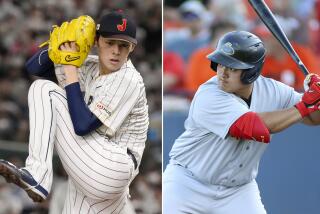Major League Baseball Scouts See Player Mine in Cuba
- Share via
While the world has watched the fall of communism in Eastern Europe, major league baseball scouts have been training their sights on a forbidden but potentially lucrative market to the south: Cuba.
Hopeful that the island nation will liberalize its economy as its former communist partners have done, some enterprising scouts have traveled to Cuba to evaluate talent and establish contacts.
At least two clubs -- the Dodgers and Montreal Expos -- planned to have representatives at the 11th Pan American Games, which opened Friday in Havana.
“The rumor is that Fidel Castro might let those guys come to play here (in the United States), so we’ve got to be ready,” said Dodgers scout Mike Brito. “If things open up, I know all the good players, don’t worry. I know how to do it. I have good contact with the people in Cuba. I’m very close to the players and the people who are in charge of baseball.”
With economic conditions worsening on the communist island, some scouts predict that Castro will be forced to issue exit visas to star athletes, as the Soviets have done in recent years.
“When that wall went down in Germany, we said, ‘Hey, now anything is possible,’ ” said Pittsburgh Pirates scouting director Jack Zduriencik. “With Cuba, I think it’s just a matter of time.”
Professional baseball was outlawed in Cuba shortly after Castro took power in 1959. At the time, Cuba was the top supplier of major-league talent from Latin America. In a move that reflected U.S. government policy, the baseball commissioner’s office banned the signing of Cuban nationals in 1977.
The resurgent interest was fueled last month by the first defection from Cuba’s world championship amateur baseball program. In an interview last week, pitcher Rene Arocha said of his former teammates, “Everybody wants to play here, because they think they’re wasting their time in Cuba.”
The heightened interest has raised concerns among some major league officials that scouts who travel to Cuba may be gaining an unfair advantage over competitors.
A U.S. trade embargo effectively bars most U.S. citizens from traveling to Cuba. Generally, U.S. citizens must obtain a Treasury Department license if they intend to spend money on the island. “Nobody’s asked for a license (from major league baseball), and no license has been granted,” said Bob Levine, a Treasury spokesman.
The embargo does not apply to U.S. citizens who do not spend any money in Cuba; for example, those who go there as guests of a foreign company or government. Journalists and Cuban-Americans who want to visit family members also are exempt.
With so many restrictions, scouting in Cuba is often a delicate topic for major league club officials. The Dodgers’ Brito is making his fourth trip to Cuba in five years. Yet Dodgers scouting director Terry Reynolds said in a recent interview, “We’ve had no contact as far as sending people down there. Obviously, it’s an advantage if you’ve got inside information that other clubs don’t have. If something would open up, you want to know all you can about particular players. But we’ve not done that ... and to my knowledge nobody is doing that either.”
Brito said he has traveled to Cuba as a guest of Mexico’s national baseball team -- not technically as a Dodgers scout. “It’s very tough, because we American citizens have to get a special permit from Washington,” he said. “But because I go with the Mexican team, it’s easy for me. I’m not Mexican, but I help the Mexican team out, so they take care of me.”
In Cuba, Brito has compiled scouting reports for the Dodgers. “So going with the Mexican team is good for me and good for the Dodgers,” he said.
Frank Wren, a U.S. citizen who is the Expos’ Latin American scouting supervisor, also planned to be in Havana this week to evaluate talent.
Asked if he’s complying with the Treasury Department regulation that prohibits spending money in Cuba, Wren said his visit is “sponsored by the Cuban Baseball Federation.”
Asked if the Cubans are paying his expenses, Wren said, “Well, they make it easy for me, let’s put it that way. ... I’d really not like to get into the specifics of it.”
Wren said he also traveled to Cuba last summer to attend an international tournament in Havana. “I was the only gringo there,” he said. Other major league clubs, including the Boston Red Sox, were represented at the tournament by scouts based in Mexico, Venezuela and the Dominican Republic.
Levine, the Treasury Department spokesman, said non-U.S. citizens employed by U.S. clubs also are bound by the trade regulations.
“Our scout (Willie Paffen) went in there accompanying the Venezuelan team,” said Red Sox scouting director Eddie Kasko. “He went there so we won’t be lost if things open up in Cuba. You want to make some acquaintances with people down there. You’d like to have an idea of, Who would be a type of person who could scout for you within that area?”
Under Castro, an avid fan and former amateur pitcher, Cuba has developed a sophisticated baseball program that has produced nine world amateur championships since 1969. If Castro opens the doors, some scouts say, Cuba could one day surpass the Dominican Republic as the leading producer of major league talent from Latin America.
“Most scouting directors would probably trade all their international scouting and the money they’ve spent in other countries if they could get into Cuba,” said Chuck LaMar, the Atlanta Braves’ scouting director. “Because the Dominican is saturated. All 26 teams are there. So, boy, Cuba would be exciting.”
“We’re looking at the Cuban team closer because of the reality that they might become available,” said Gary Nickels, the Baltimore Orioles’ scouting director. “I don’t know what the future is going to bring, but nobody believed there’d be Soviets playing in the National Hockey League.”
“Everybody’s saying, ‘If it could happen in Russia, why couldn’t it happen in Cuba?’ ” said Brian Sabean, the New York Yankees’ vice president for scouting. “Castro needs dollars, and he needs favorable publicity to deflect his problems. And Castro knows that athletes are one of his resources.”
Scouts generally agree the Cubans have at least several ready-made major league players and dozens of prospects. They also agree that most Cuban hitters, who are accustomed to using aluminum bats instead of wood, would require a period of adjustment.
The Pan Am Games give scouts another opportunity to ogle Cuba’s would-be major league prospects, including third baseman Omar Linares, left fielder Orestes Kindelan, second baseman Antonio Pacheco and shortstop German Mesa.
Cuban baseball stars have repeatedly said they play for the love of sport and their revolution -- not for capitalist riches. Castro has said he’s proud Cuban athletes often repeat the slogan he uses to end his speeches: “Socialismo o muerte -- Socialism or death.”
But according to Arocha, the pitcher who defected July 10, many of these athletes would turn pro if given the opportunity.
“Of course they say they’re not playing for money, because that’s true,” Arocha said. “You can’t be playing for money when you’re hardly making any. I earned 230 pesos a month (about $300 at the official rate of exchange), and nobody on the team has a car, not even the older players. And yes, the players complain about these things -- privately, of course.”
Arocha, in an interview last week in Miami, said that during the 1970s and early 1980s each member of Cuba’s national baseball team was allowed to buy a car at a discounted price when he retired.
“But now they’re not giving the players that option; we have to take the bus,” Arocha said. “Last year, they gave each of the baseball coaches and directors a car, the latest (Soviet-made) Lada model. But the players -- the ones who do everything on the field -- didn’t get anything.
“A lot of the coaches really deserve a car, because they’ve been there a lot of years. But there are others who’ve only been there one or two years, and they got a car. And players like (centerfielder) Victor Mesa, who’ve been on the national team for 10 or 11 years, they don’t have anything.”
Under major league rules Arocha will be eligible to sign a pro contract when he becomes a U.S. resident. He cannot apply for residency until he has been in the U.S. for one year and one day.
While Arocha is not considered a sure-fire major league prospect, scouts say his defection may send a message to Cuban athletes.
“Now that Arocha is here, I think more players will try to defect,” said Philadelphia Phillies scout Willy Calvino, a Cuban-American. “Cuba’s a hungry country, and these players want an opportunity to make money.”
Scouts who have traveled to Cuba in recent years say they are treated with respect, even though they represent an outlawed system of sport.
“The Cubans let you speak to their players and go right in their clubhouse,” said Toronto Blue Jays international scouting director Wayne Morgan. “Scouting in Cuba is no different than anywhere else, other than you can’t get them out.”
“Some (Cuban sports officials) have asked me how much I think some of their players would be worth on the open market,” said the California Angels’ Preston Gomez, a former major-league manager who has visited Cuba eight times over the last 22 years. “Of course, nothing can be done without Castro’s approval. But they still ask you about this, one on one.”
Gomez, a longtime acquaintance of Castro and a prominent figure in Cuba during the pre-Castro 1950s, senses a change is coming.
“My feeling is Castro will allow his baseball players to turn pro next year after they try to win a gold medal at the Olympics in Barcelona,” Gomez said, “because the economic situation in Cuba is so bad.
“You know what breaks my heart? When I go to Cuba and these former Cuban players come up to me and they want a pair of socks. Or they have a daughter, and she needs a dress.
“The heat is on. Fidel Castro is struggling. So, before long, I believe he’ll be forced to open up everything, including baseball.”
More to Read
Go beyond the scoreboard
Get the latest on L.A.'s teams in the daily Sports Report newsletter.
You may occasionally receive promotional content from the Los Angeles Times.










